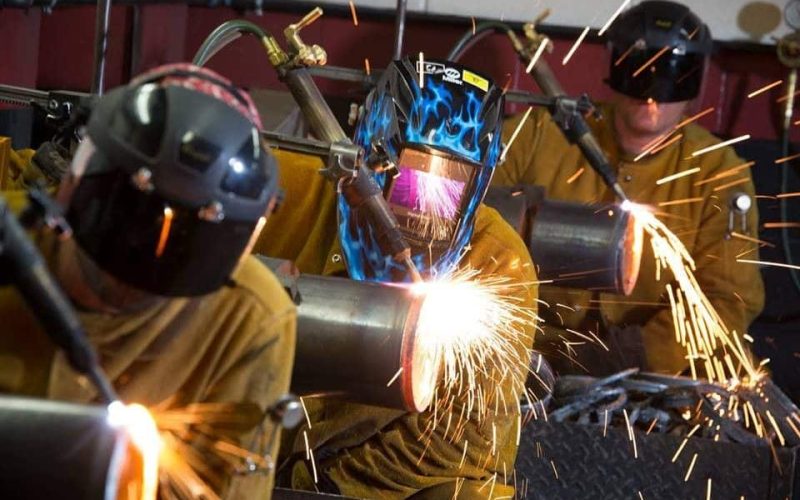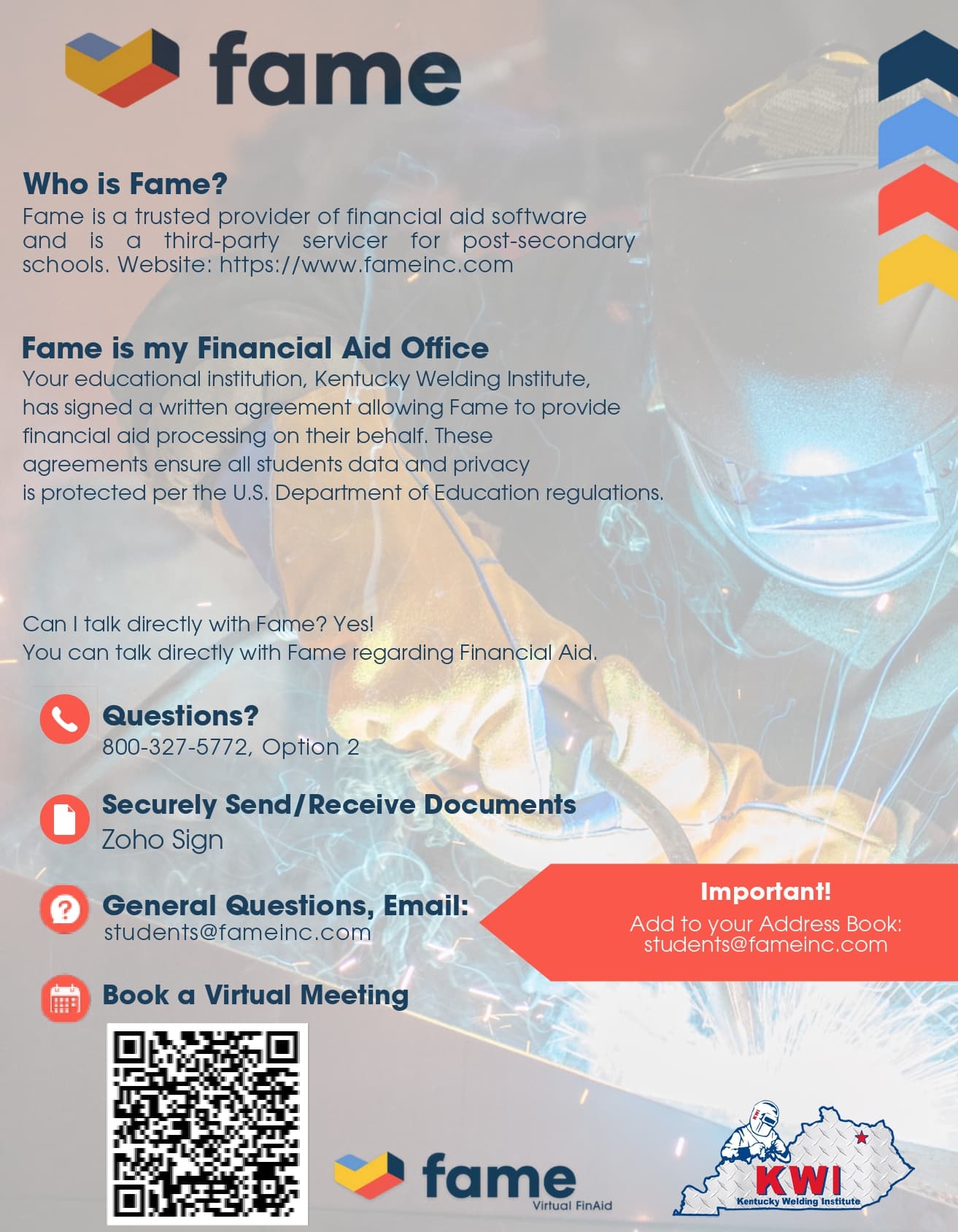
Why You Can’t Afford to Delay Getting Your Certified Welding Inspector Certification
Introduction
At Kentucky Welding Institute (KWI), we’ve helped hundreds of professionals achieve their Certified Welding Inspector (CWI) certification and launch successful careers. Our comprehensive program combines expert instruction, hands-on training, and exam preparation to ensure your success in this high-demand field.
KWI’s CWI certification program delivers:
- Expert instruction from certified professionals
- Hands-on inspection experience
- AWS exam preparation
- Career placement assistance
- Industry networking opportunities
In the industrial and construction world, the role of a Certified Welding Inspector (CWI) is indispensable. As industries prioritize safety, quality, and compliance, certified professionals are in higher demand than ever. Delaying your pursuit of a certified welding inspector certification can mean falling behind in a competitive field brimming with opportunities.
This certification is more than just a credential—it’s a gateway to a thriving career. Whether you are aiming to secure higher-paying jobs, enhance your professional reputation, or expand your career internationally, the time to act is now. In this article, we’ll explore why obtaining your certification today is a critical step in achieving long-term success.
Understanding the Role of a Certified Welding Inspector
A certified welding inspector ensures that welding processes and outcomes meet established safety and quality standards. Their responsibilities include inspecting welds, verifying compliance with codes, and maintaining structural integrity in projects across industries like construction, energy, and manufacturing.
What Sets CWIs Apart
The key factor distinguishing CWIs from other professionals in the welding field is their certified status. The certification, granted by a governing body such as the American Welding Society (AWS), validates its expertise in visual inspection, welding technology, and regulatory compliance.
Skills That Make CWIs Indispensable
- Technical Knowledge: A thorough understanding of welding codes and standards.
- Attention to Detail: Ability to identify even the smallest defects.
- Problem-Solving: Proficiency in resolving issues related to materials and welding processes.
- Communication: Translating technical findings into actionable reports.
The Growing Demand for Certified Welding Inspectors
Across the globe, industries are experiencing a boom in infrastructure development and technological advancements. With these advancements comes an increasing need for qualified professionals to oversee the welding process. Certified welding inspectors are at the forefront of this movement, making their expertise more essential than ever.
Industry Growth and Job Opportunities
- Construction: Skyscrapers, bridges, and urban infrastructure demand precise welding to ensure structural integrity.
- Energy Sector: From oil rigs to renewable energy projects, certified inspectors oversee critical welding processes to meet stringent safety standards.
- Manufacturing: Automobiles, aircraft, and heavy machinery rely on certified professionals to guarantee the reliability of welded components.
- Pipeline Construction: The transport of vital resources like oil and gas requires secure, leak-proof pipelines monitored and inspected by CWIs.
A Global Skill
The need for certified welding inspectors extends beyond borders. Many countries require internationally recognized certifications for welding professionals, making this career path an opportunity to work in diverse environments around the world.
The Risks of Delaying Your Certification
While some may hesitate due to time or cost, delaying your certified welding inspector certification can have significant downsides. Here’s why taking action now is critical:
- Missed Opportunities
Industries are actively hiring CWIs to meet growing project demands. Delaying your certification means potentially losing out on high-paying job offers and career advancement opportunities. - Outdated Skills
Welding technology evolves rapidly, and being out of step with these advancements can make you less competitive in the job market. Certified inspectors receive up-to-date training that aligns with current industry standards. - Stagnant Career Growth
Without certification, career progression can plateau. Employers value certified professionals for their proven expertise and commitment to quality. - Financial Impact
The difference in earning potential between certified and non-certified welding professionals is significant. CWIs often earn 30–50% more than their uncertified peers, meaning that every month of delay translates to missed income.
Financial and Career Benefits of Certification
Achieving a certified welding inspector certification is a worthwhile investment that offers both immediate and long-term returns.
- Increased Earning Potential
Certified welding inspectors command competitive salaries. Depending on your location, experience, and industry, you can expect annual earnings ranging from $70,000 to over $100,000. - Job Security
Industries value CWIs for their expertise and reliability. With certification, you become indispensable, even in uncertain economic times. - Professional Credibility
Earning your certification demonstrates a commitment to excellence and professionalism, setting you apart from competitors. - Access to Leadership Roles
Certification qualifies you for supervisory and managerial positions, where you can oversee teams, enforce compliance, and shape project outcomes. - Contribution to Safety and Quality
Your work as a certified inspector ensures that projects meet safety standards, protecting lives and infrastructure.
How to Become a Certified Welding Inspector
The journey to becoming a certified welding inspector requires dedication, training, and passing a rigorous examination. Here are the steps to guide you:
- Choose a Training Program
Select a reputable institution like Kentucky Welding Institute (KWI) that offers specialized welding inspector training. Look for programs that provide a balance of theoretical knowledge and practical skills. - Gain Industry Experience
Most certification programs require candidates to have relevant work experience. This could include time spent as a welder, welding supervisor, or quality control professional. - Prepare for the Exam
The AWS CWI exam consists of three parts:- Fundamentals: Covers welding principles and practices.
- Practical: Tests your ability to identify defects and apply inspection methods.
- Code Book: Evaluate your understanding of welding codes.
Comprehensive training programs, such as those offered by KWI, often include mock exams and study guides to help you succeed.
- Earn Your CertificationPassing the AWS CWI exam earns you the certified welding inspector designation, opening the door to a world of professional opportunities.
Why Kentucky Welding Institute (KWI) is Your Best Choice
When it comes to preparing for your certification, the Kentucky Welding Institute (KWI) stands out as the trusted provider of welding inspector training. Here’s why KWI is the right choice for you:
Expertise and Experience
KWI instructors bring years of field experience and in-depth knowledge to the classroom, ensuring you receive a top-quality education. They have a deep understanding of the welding industry and provide you with insights that will set you apart as a Certified Welding Inspector.
State-of-the-Art Facilities
KWI’s modern training facilities offer hands-on learning opportunities with the latest equipment and technologies. From mock examinations to real-world inspection tools, you’ll gain the practical experience you need to excel in your career.
Comprehensive Curriculum
KWI’s training program covers all aspects of welding inspection, from the fundamentals to advanced inspection techniques. Whether you’re new to the field or looking to refresh your skills, KWI’s program ensures you’re fully prepared for the AWS CWI exam.
Career Support
At KWI, we don’t just train you—we prepare you for a successful career. Our program includes job placement assistance and networking opportunities that connect you with top employers in the industry. We are dedicated to helping you achieve long-term career success.
The Cost of Waiting: A Long-Term Perspective
Delaying your certification doesn’t just affect your immediate prospects—it can have a long-lasting impact on your career trajectory. Consider the following consequences:
- Lost Income
Waiting a year to earn your certification could mean losing out on tens of thousands of dollars in potential earnings. - Reduced Career Mobility
Without certification, you may be limited to entry-level roles with fewer growth opportunities. Achieving your certification today opens up doors to higher-level positions.
Diminished Professional Reputation
Earning your certification now positions you as a forward-thinking professional, while delays may create a perception of hesitation or lack of commitment.
The Role of Continuous Learning in a Certified Welding Inspector Career
Earning a Certified Welding Inspector certification is just the beginning. Continuous learning and staying updated on advancements in welding technology, materials, and techniques are essential for long-term success in this field. Welding inspection is a dynamic profession, influenced by changes in industry standards and innovations in technology.
- Evolving Standards
New codes and regulations emerge regularly, and certified professionals must adapt to ensure compliance. - Technological Integration
Tools like ultrasonic testing, radiographic inspection, and advanced welding methods require inspectors to stay knowledgeable. - Professional Development
Participation in workshops, advanced certifications, and specialized courses can enhance your expertise and career prospects.
By committing to lifelong learning, you ensure that your skills remain relevant, giving you a competitive edge in the market.
Challenges Faced by Non-Certified Inspectors in Today’s Market
Without certification, welding inspectors face numerous challenges that can hinder their career progression and earning potential. Certification not only validates skills but also addresses many common roadblocks faced by uncertified professionals.
- Limited Job Opportunities
Many employers mandate certifications for hiring, leaving uncertified inspectors with fewer options. - Lower Earnings
Non-certified professionals often struggle to negotiate competitive salaries, while certified inspectors can command higher pay. - Lack of Credibility
Clients and employers are less likely to trust the expertise of uncertified inspectors. Certification gives you the credibility to stand out. - Restricted Scope
Without formal training, uncertified inspectors may lack knowledge of industry-specific codes and standards.
Investing in certification resolves these challenges, positioning you as a reliable and skilled professional in the field.
Key Attributes of a Successful Certified Welding Inspector
Achieving success as a Certified Welding Inspector requires more than just technical knowledge. Specific attributes and soft skills distinguish top-performing CWIs from their peers.
- Strong Analytical Skills
The ability to interpret complex codes, drawings, and welding specifications is vital. - Attention to Detail
Inspectors must identify flaws and inconsistencies, no matter how small, to ensure safety and quality. - Effective Communication
CWIs frequently liaise with welders, engineers, and project managers, requiring clear and concise communication. - Adaptability
Working across various industries and environments demands flexibility and a willingness to learn.
By cultivating these attributes, CWIs can excel in their roles, building strong reputations and advancing their careers.
The Economic Impact of Welding Inspector Training
Investing in welding inspector training not only enhances your career but also contributes to the economy by ensuring quality standards in industrial projects. Here’s how welding inspectors create measurable economic value:
- Preventing Costly Errors
By identifying defects early, certified inspectors save companies millions in rework and repairs. - Enhancing Productivity
Skilled inspectors streamline project workflows, reducing delays and improving efficiency. - Ensuring Regulatory Compliance
Avoiding fines and legal issues by adhering to standards protects businesses from financial liabilities. - Supporting Sustainability
Inspectors help maintain the structural integrity of projects, extending their lifespan and reducing waste.
Training as a welding inspector is not just an individual investment but a contribution to the success and sustainability of the industries you serve.
Emerging Trends Shaping the Future of Welding Inspection
As technology and industry demands evolve, Certified Welding Inspectors must be prepared to embrace emerging trends that are reshaping their roles. Staying ahead of these trends ensures continued success and relevance.
- Automation and Robotics
Automated welding processes require inspectors who understand robotic systems and their inspection criteria. - Green Welding Practices
Environmental concerns are driving the adoption of sustainable welding methods, creating new challenges and opportunities for inspectors. - Advanced Inspection Techniques
Innovations like 3D imaging and artificial intelligence are transforming the way inspections are conducted. - Globalization of Standards
As projects span multiple countries, CWIs must become familiar with international welding codes and standards.
By adapting to these changes, certified welding inspectors remain at the forefront of their profession, ready to tackle the challenges of tomorrow.
The Global Recognition and Versatility of a Certified Welding Inspector Certification
One of the most significant advantages of earning a Certified Welding Inspector certification is its global recognition. This certification is respected worldwide, opening up opportunities for professionals to work across diverse industries and regions.
- Global Recognition and Mobility
- Standardized Credentials: The certification, especially those granted by bodies like AWS, is universally acknowledged, making you a sought-after professional in global markets.
- International Compliance: Certified welding inspectors are trained to understand and apply international standards like ISO, ASME, and EN codes, enabling them to work seamlessly across borders.
- Opportunities in Emerging Markets: Developing countries with growing infrastructure need to actively seek certified professionals to maintain quality and safety.
- Versatility Across Industries
The skills gained during the certification process are not industry-specific, allowing CWIs to work in various sectors:- Oil and Gas: Inspecting pipelines and drilling structures.
- Automotive: Ensuring the safety and reliability of welded vehicle components.
- Shipbuilding: Overseeing the construction of vessels with complex welding requirements.
- Renewable Energy: Verifying the integrity of wind turbine structures and solar energy systems.
A globally recognized certification positions you as an adaptable professional, ready to meet the challenges of any industry.
How Certified Welding Inspectors Drive Innovation and Excellence in the Industry
Certified welding inspectors are more than just quality controllers; they are instrumental in driving innovation and maintaining excellence across industrial sectors. Their expertise fosters progress and ensures that projects meet the highest standards.
- Promoting Innovation
- Improving Welding Techniques: Certified inspectors provide feedback to welders, enabling the refinement of welding methods for better efficiency and performance.
- Adopting New Technologies: CWIs play a critical role in evaluating and integrating technologies like laser welding and friction stir welding into projects.
- Advancing Material Science: Inspectors work with engineers to explore new materials, improving the durability and sustainability of welded structures.
- Maintaining Excellence
- Setting Benchmarks: Certified professionals establish quality benchmarks for projects, ensuring consistency and reliability.
- Enhancing Team Collaboration: CWIs act as a bridge between welders, engineers, and project managers, aligning everyone with the project’s goals.
- Reducing Defects: By identifying issues early, inspectors minimize defects, reducing costs and project delays.
Supporting Safety and Sustainability
Inspectors’ contributions go beyond project outcomes. They ensure compliance with environmental standards and uphold worker safety, creating a positive impact on both the industry and society. By driving innovation and maintaining excellence, certified welding inspectors prove to be invaluable assets, shaping the future of the welding profession.
The Future of Certified Welding Inspectors
The career outlook for certified welding inspectors is exceptionally bright. With increasing emphasis on quality and safety in industries worldwide, the demand for certified professionals is expected to grow steadily. By acting now, you can secure your place in this dynamic and rewarding field.
Conclusion
Becoming a Certified Welding Inspector is not just an achievement—it’s a strategic career move. The certification sets you apart as an expert in a high-demand field, offering financial rewards, professional credibility, and global opportunities. Delaying this critical step can result in lost time, income, and opportunities.
The best time to act is now. Begin your journey with a trusted partner like Kentucky Welding Institute, where expert training and comprehensive support ensure your success. Take charge of your career today and unlock the potential of a certified welding inspector career.
Frequently Asked Questions (FAQs):
1. What is a Certified Welding Inspector (CWI)?
A professional certified to inspect and ensure the quality and safety of welds.
2. Why should I get a Certified Welding Inspector certification?
To boost career opportunities, increase earning potential, and gain industry recognition.
3. Which industries hire Certified Welding Inspectors?
Construction, oil and gas, manufacturing, and energy sectors.
4. How does delaying certification impact my career?
It limits job prospects, reduces earning potential, and slows career growth.
5. What skills are essential for a Certified Welding Inspector?
Technical expertise, attention to detail, communication, and adaptability.
FAQs:
Ans: MIG welding, or Metal Inert Gas welding, is a versatile and efficient welding process. Unlike other methods like TIG welding, which requires more precision, MIG welding uses a continuous wire feed and shielding gas to form the weld pool. At KWI, our program teaches you the ins and outs of MIG welding stainless steel, preparing you for real-world applications in industries like aerospace, automotive, and construction.
Ans: No! Whether you’re a beginner or an experienced welder, KWI’s MIG welding program is designed for all skill levels. We provide step-by-step instruction, hands-on practice, and expert guidance to help you master MIG welding techniques, including welding stainless steel with a MIG welder.
Ans: The length of the program varies depending on your prior experience and dedication. On average, students complete the program in about 6 to 12 months, with plenty of hands-on practice time to perfect their skills and gain the knowledge needed for professional certification.
Ans: Yes! One of the key benefits of enrolling in KWI’s program is our career placement assistance. Our team works with you to connect you with top employers in the welding industry, ensuring that you’re prepared to enter the workforce with confidence and a certification that’s recognized nationwide.
Ans: After completing KWI’s MIG welding program, you’ll be qualified for a variety of positions in industries such as aerospace, automotive, construction, and manufacturing. Some examples of job roles include MIG welder, welding technician, fabricator, and welding inspector.



